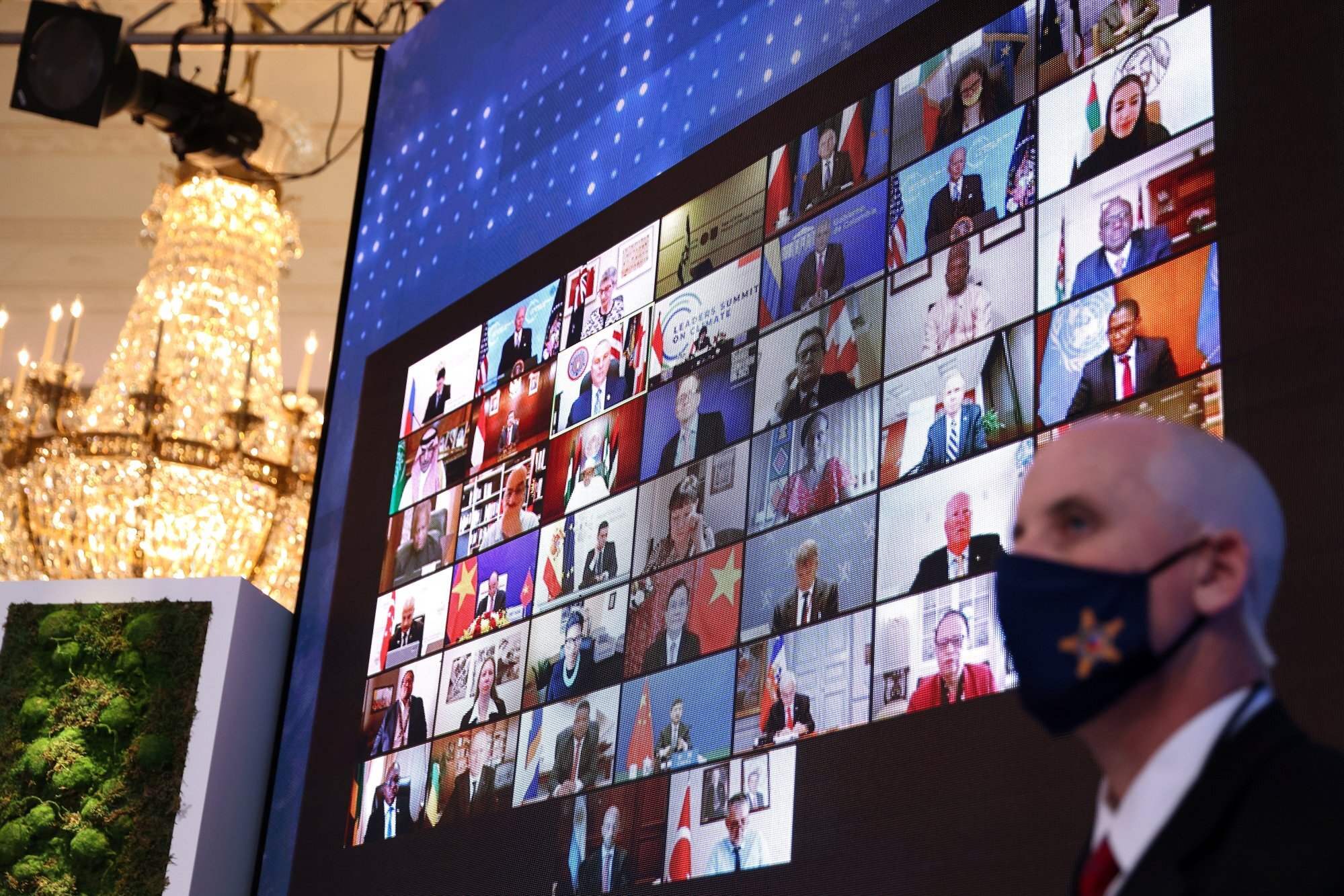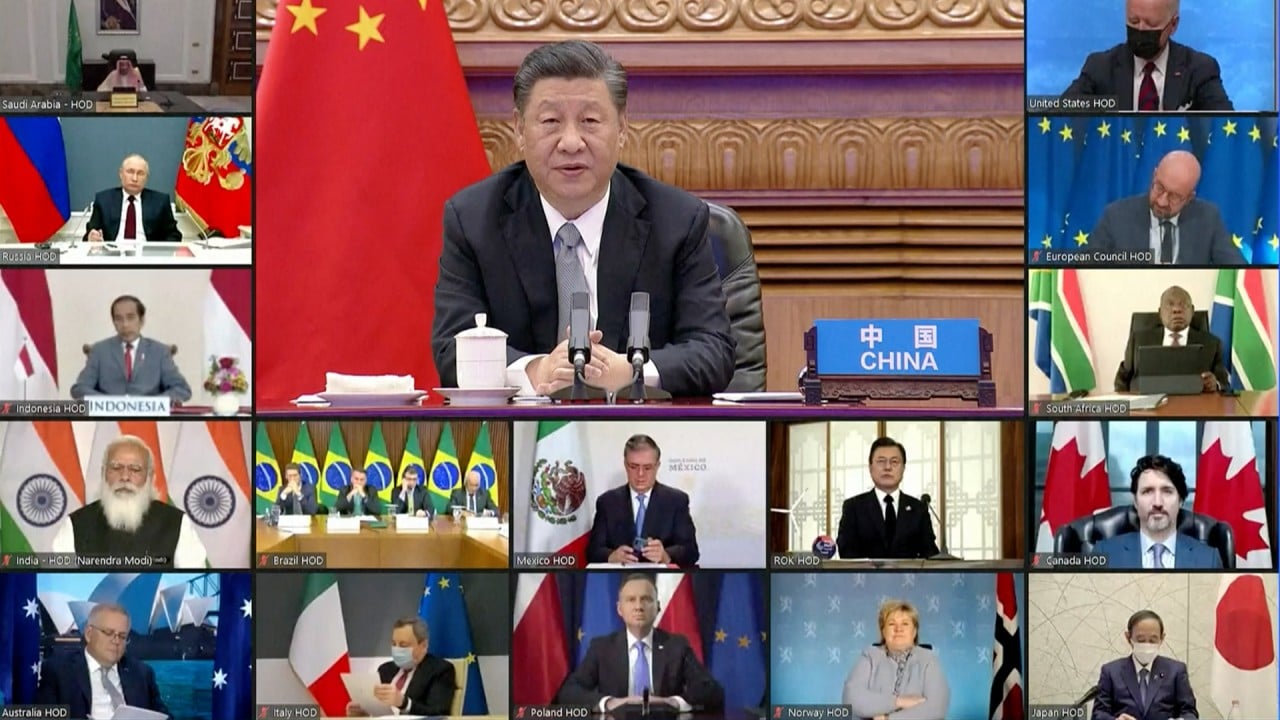
Joe Biden frames climate change battle as chance to create jobs, boost economy
- ‘Using just today’s technologies won’t allow us to meet our ambitious goals,’ Microsoft co-founder Bill Gates says on final day of climate summit
- US president also warns that leaders’ commitments without action are just ‘hot air’
“It’s an opportunity to create millions of good-paying jobs around the world in innovative sectors – jobs that bring greater quality of life, greater dignity, to the people who are performing those jobs in every nation,” Biden said, calling climate action “an economic imperative”.
The remarks, delivered on the second day of a US-hosted climate summit, were among more than 90 mentions of the word “jobs” by the heads of state, business leaders and others who gathered for the final sessions.
The summit has seen fresh climate pledges from numerous countries, with more than half of the world’s economy now committed to the pace of action needed to limit global temperature increases to 1.5 degrees Celsius (2.7 degrees Fahrenheit) – the goal laid out in the 2015 Paris Agreement.
But the gathering also saw vague or non-existent commitments from other participants, with China and Russia – the top and fourth largest emitters, respectively – unveiling no specific targets.
“Every country will need to invest in new, clean energy technologies as we work [toward] net zero emissions,” Biden said.
The virtual summit’s closing sessions saw a parade of speakers stress the need for investment in technological solutions to the climate crisis, ranging from capturing carbon and battery efficiency to synthetic fuels and tapping geothermal energy trapped below the earth’s surface.
“Using just today’s technologies won’t allow us to meet our ambitious goals,” said Microsoft co-founder Bill Gates, pointing to the higher cost of current zero carbon technology compared with its fossil fuel counterparts.
Biden says his US$2.3 trillion infrastructure plan is essential for US to compete with China
The focus on the private sector dovetailed with efforts by Biden administration officials to portray the US as a trustworthy climate champion that will harness market forces to insulate progress from future political volatility.
Speaking to reporters on Thursday, US climate envoy John Kerry said current progress would be shielded from any backsliding from future administrations because of the sheer amount of investment – “trillions of dollars, trillions of yen, trillions of euros” – being funnelled into the clean energy marketplace.
In an apparent dig at former president Donald Trump, who withdrew the US from the Paris Agreement, Kerry said: “No politician, no matter how demagogic, or how potent and capable they are, is going to be able to change what that market is doing because it will have moved. It will have four years of entrenchment, and those jobs will be there.”

According to data from the Bureau of Labour Statistics, of the top three US job markets that will enjoy growth of more than 50 per cent this decade, two relate to renewable energies: wind turbine technicians (61 per cent) and solar panel installers (51 per cent).
Globally, the clean energy market is expected to be worth at least US$23 trillion by 2030, US Energy Secretary Jennifer Granholm said, calling innovation in climate-related technology “our generation’s moon shot”.
“For too long this climate conversation has been viewed as a zero-sum game, one of trade-offs: the climate or the economy,” Granholm said on Friday. “No longer.”
Biden sets out US$2 trillion plan to boost US economy and challenge China
Speaking soon after Granholm, however, Norwegian Prime Minister Erna Solberg warned against an overreliance on the market, calling on governments to take an active role in guiding the private sector.
“Carrots and sticks do help technologies past their tipping points,” Solberg said, stressing in particular the need for higher carbon pricing.
While Friday’s sessions were largely optimistic in tone, leaders were dealt a blunt reality check when the head of the International Energy Agency (IEA) stressed that commitments alone were meaningless.
“Right now, the data does not match the rhetoric, and the gap is getting wider and wider,” Fatih Birol said, adding that countries had failed to recover from the Covid-19 pandemic in a “sustainable way”.

Recent estimates by the IEA, a Paris-based organisation comprising 30 member countries, indicate that 2021 is on track to record the second-highest increase of emissions in history.
In his closing address, Biden agreed that commitments without action were just “hot air”.
Appearing alongside Biden on Friday, cabinet secretaries appeared eager to use an international platform to speak to domestic constituencies, often mentioning Biden’s “American Jobs Plan”.
The US$2 trillion proposal, centred around curtailing US emissions while upgrading the country’s ailing infrastructure, faces stiff opposition from Republicans, who say it is too expensive and too broad.
China can help Biden ‘build back better’ and boost US infrastructure
On Thursday, Senate Republicans introduced their own US$568 billion package in response, which was in turn criticised as “far too small” by their Democratic counterparts.
In an example of Republican resistance to Biden’s climate agenda, Representative David McKinley of coal-rich West Virginia said the administration’s new emissions targets would “destroy livelihoods, disrupt families, decimate communities, increase utility bills and threaten the stability of the grid”.
The administration’s new target, he added, would “only hamper our global competitive edge”.
And proving that any ambitious climate legislation would face a barrage of top-down Republican opposition, Senate Minority Leader Mitch McConnell said on Thursday: “This is quite a one-two punch. Toothless requests of our foreign adversaries and maximum pain for American citizens.”


